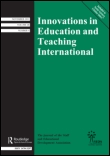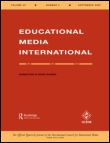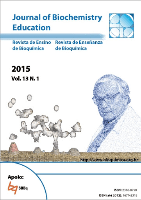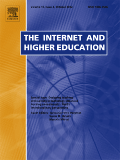
Campus Virtuales
Scope & Guideline
Pioneering Insights in Education and Computer Science
Introduction
Aims and Scopes
- Technological Integration in Education:
Exploring how digital tools and platforms, such as Moodle and other Learning Management Systems (LMS), can enhance teaching and learning experiences in various educational settings. - Development of Digital Competencies:
Focusing on the skills required for effective participation in digital environments, particularly for educators and students, emphasizing the importance of digital literacy and media education. - Innovative Teaching Methodologies:
Investigating new pedagogical approaches, including blended and hybrid learning, gamification, and project-based learning, to improve student engagement and learning outcomes. - Inclusive Education Practices:
Addressing the need for materials and methodologies that cater to diverse learning needs, including those of students with disabilities and varying socio-demographic backgrounds. - Research on Learning Outcomes and Assessment:
Analyzing the effectiveness of various teaching strategies and the impact of digital tools on student performance and engagement, contributing to the field of educational assessment.
Trending and Emerging
- Impact of COVID-19 on Education:
The pandemic has accelerated discussions around online teaching, learning methodologies, and the adaptation of educational practices to remote environments, highlighting the need for resilience in education. - Gamification and Game-Based Learning:
There is an increasing focus on gamification as a tool for enhancing student engagement and learning outcomes, with studies exploring its application in various educational contexts. - Inclusive and Accessible Education:
Emerging research is increasingly centered around creating inclusive educational materials and practices, particularly for marginalized groups, including students with disabilities and those from diverse backgrounds. - Community of Inquiry Framework:
The Community of Inquiry model is gaining traction as a framework for understanding and enhancing online learning experiences, indicating a trend towards collaborative and interactive learning environments. - Digital Assessment and Competency Measurement:
There is a growing interest in developing and validating instruments to assess digital competencies and learning outcomes, reflecting the need for effective evaluation methods in digital education.
Declining or Waning
- Traditional Teaching Methods:
There is a noticeable decrease in research focused on conventional, non-digital teaching methods as the emphasis shifts towards innovative and technology-enhanced educational practices. - General Education Topics:
Broad discussions on general education topics without a technological focus are becoming less frequent, indicating a shift towards more specialized and technologically integrated educational research. - Physical Classroom Dynamics:
As online and blended learning become more prevalent, the focus on physical classroom dynamics and traditional face-to-face interactions is waning, reflecting a broader trend towards virtual and hybrid learning environments.
Similar Journals

Electronic Journal of e-Learning
Transforming Education with Cutting-Edge Research and PracticesElectronic Journal of e-Learning is a prominent peer-reviewed publication dedicated to the exploration and dissemination of advancements in the fields of e-learning, computer science applications, and educational technologies. Published by ACAD CONFERENCES & PUBL INT LTD since 2003 as an open-access journal, it facilitates the free exchange of knowledge, ensuring researchers, educators, and practitioners have unrestricted access to cutting-edge research and innovative practices. With an impressive impact factor reflecting its influence, the journal has achieved a Q2 ranking in both Computer Science Applications and Education for 2023, placing it among the top-tier journals in its field. The Electronic Journal of e-Learning serves as a crucial platform for scholarly discussions, helping to shape the future of educational practices and technology integration. As it converges from 2011 to 2024, the journal continues to invite submissions that advance the understanding and application of e-learning strategies across varied educational contexts.

INNOVATIONS IN EDUCATION AND TEACHING INTERNATIONAL
Exploring the future of education, one article at a time.INNOVATIONS IN EDUCATION AND TEACHING INTERNATIONAL, published by Routledge Journals, Taylor & Francis Ltd, is a premier, peer-reviewed journal dedicated to disseminating cutting-edge research and best practices in the field of education. With an impressive Q1 category ranking in Education, this journal is recognized for its influential contributions, boasting a Scopus Rank of #288 out of 1543 in Social Sciences – Education, placing it in the 81st percentile of its category. Established in 1996 and continuing to thrive through 2024, INNOVATIONS IN EDUCATION AND TEACHING INTERNATIONAL focuses on fostering scholarly discourse around emerging educational methodologies, pedagogical innovations, and the integration of technology in teaching. As an open-access journal, it ensures that groundbreaking research is accessible to a global audience, empowering educators, researchers, and policy-makers to enhance teaching and learning experiences. By publishing high-quality, empirical studies and theoretical contributions, this journal plays a vital role in shaping the future of education.

Educational Media International
Fostering dialogue on the role of media in education.Educational Media International, published by Routledge Journals, Taylor & Francis Ltd, is a premier journal in the interdisciplinary fields of Communication and Education, with a commendable Q2 ranking in both categories as of 2023. Established in 1978, this journal serves as a significant platform for the dissemination of innovative research that explores the evolving intersection of media technologies and educational practices. With an emphasis on both theoretical and practical applications, it addresses crucial topics such as digital learning environments, multimedia educational resources, and the impact of social media on education, making it an essential resource for researchers, professionals, and students alike. Located in the United Kingdom, Educational Media International not only contributes to the academic discourse but also reflects global trends and challenges in education, fostering a deeper understanding of the vital role media plays in shaping learning experiences worldwide.

E-Learning and Digital Media
Fostering collaboration between education and technology.E-Learning and Digital Media, published by SAGE Publications Inc, is a premier academic journal dedicated to the innovative intersection of digital technologies and education. With a strong commitment to advancing research in the fields of education and computer science, this journal has established itself as a vital resource for researchers, professionals, and students alike. As of 2023, it proudly holds a Q2 ranking in both Computer Science Applications and Education, reflecting its impact and reach within the academic community. The journal encompasses a wide range of topics exploring the effectiveness and applications of e-learning technologies, pedagogical strategies, and digital media in educational settings. Since its inception in 2009, E-Learning and Digital Media has continuously contributed to the understanding and development of digital education, ensuring relevancy in an ever-evolving landscape. With an open access model intended to foster accessibility and dissemination of knowledge, this journal invites submissions that push the boundaries of traditional education through cutting-edge research and practice.

Advanced Education
Exploring New Horizons in Educational MethodologiesAdvanced Education is a distinguished open-access journal dedicated to the interdisciplinary study of educational methodologies and innovations, published by the National Technical University of Ukraine - Kyiv Polytechnic Institute, Faculty of Linguistics. Since its inception in 2014, the journal has endeavored to disseminate high-quality research findings and theoretical work that contribute to advancements in educational practices and policy-making. With the increasing need for accessible education resources in our rapidly evolving global landscape, Advanced Education plays a critical role in bridging gaps between linguistic studies and educational technology, providing a platform for scholars, educators, and practitioners to share their insights. The journal aspires to enhance educational quality and effectiveness, making it an indispensable resource for researchers, professionals, and students engaged in the field of education.

JMIR Medical Education
Elevating Standards in Medical Education WorldwideJMIR Medical Education is a leading journal published by JMIR Publications, Inc., specializing in the dynamic intersection of education and healthcare. Since its inception in 2015, the journal has embraced an open access model, ensuring that groundbreaking research is freely accessible to a global audience and facilitating knowledge exchange among educators, clinicians, and policy-makers. With an impressive impact factor established through its robust contributions to the field, JMIR Medical Education has quickly secured its position in the top quartile (Q1) of educational journals, ranking #137 out of 1543 in Social Sciences - Education and #58 out of 636 in Medicine - General Medicine according to Scopus metrics. This journal aims to address contemporary issues in medical education through innovative research, comprehensive reviews, and practical insights that enhance teaching and learning outcomes in the medical field. Positioned in Toronto, Canada, it reflects a commitment to advancing education in healthcare worldwide, making it an essential resource for researchers, professionals, and students dedicated to improving educational practices in medicine.

REDU-Revista de Docencia Universitaria
Advancing Pedagogy for a Brighter Academic FutureREDU-Revista de Docencia Universitaria, published by UNIV POLITECNICA VALENCIA, EDITORIAL UPV, is a prominent open-access journal dedicated to advancing the field of higher education pedagogy. Established in 2008, this journal serves as a vital platform for academics and educators to share insightful research and innovative practices aimed at improving university teaching and learning. With a commitment to fostering educational excellence, REDU promotes a rich dialogue among researchers, professionals, and students across various disciplines. The journal is indexed by notable databases, ensuring wide visibility and accessibility of published works. By addressing contemporary challenges and developments in university instruction, REDU plays a crucial role in shaping educational methodologies and informing policies within the academic landscape.

Revista de Ensino de Bioquimica
Elevating Biochemistry Education for a Brighter TomorrowRevista de Ensino de Bioquimica, published by the SOC BRASILEIRA BIOQUIMICA & BIOLOGIA MOLECULAR, stands as an essential platform for advancing the field of biochemistry education. With an ISSN of 2318-8790 and an established open access model since 2001, the journal entices a diverse audience including researchers, educators, and students who are committed to the enhancement of teaching methods and learning strategies in biochemistry. The journal is dedicated to promoting innovative pedagogical practices and fostering scholarly dialogue in order to improve educational outcomes and engagement in the biosciences. Notably based in Sao Paulo, Brazil, the journal is pivotal for disseminating vital research and insights that can assist academic institutions and practitioners globally. Readers can access a wealth of knowledge that aims to bridge the gap between biochemical research and education, ensuring the continuous evolution of the discipline.

Revista Electronica Calidad en la Educacion Superior
Cultivating Research for Educational TransformationRevista Electronica Calidad en la Educacion Superior is a prominent academic journal dedicated to advancing research in the field of higher education quality. Published by UNIV ESTATAL DISTANCIA, this journal serves as a vital platform for scholars, educators, and practitioners who are committed to enhancing the standards and effectiveness of higher education in Latin America and beyond. The journal emphasizes the dissemination of innovative ideas and practices that contribute to educational excellence. Although it operates under an open-access model, the available content can be freely accessed by researchers and interested readers to foster wider dissemination and engagement within the academic community. With its headquarters in San Pedro Montes Oca, San Jose, Costa Rica, this journal aims to bridge the gap between theory and practice, providing insights and empirical studies that help shape policy and reform in higher education. As educators and researchers increasingly focus on quality assurance and improvement in educational systems, Revista Electronica Calidad en la Educacion Superior stands out as an essential resource for aligning current practices with emerging trends and challenges in the sector.

Internet and Higher Education
Transforming Education through Digital InnovationWelcome to Internet and Higher Education, a premier journal published by Elsevier Science Inc, focusing on the dynamic intersection of technology and education. Established in 1998, this journal provides a platform for innovative research and critical discussions in the fields of Computer Networks and Communications, Computer Science Applications, and E-learning, consistently ranked in the Q1 quartile across multiple categories in 2023. With an impressive Scopus ranking placing it in the top 1% of Social Sciences and Computer Science categories, Internet and Higher Education aims to foster interdisciplinary collaboration and advance our understanding of digital learning environments. The journal invites contributions that explore the impact of the internet on higher education, offering tangible insights for educators, administrators, and policymakers alike. Stay updated on the latest findings and trends that are shaping the future of education through technology.